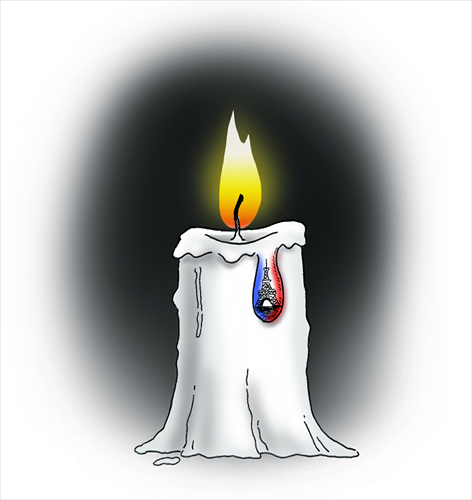European Union must meet terrorist challenge head-on

Illustration: Liu Rui/GT
Right after the terrorist attacks in Paris, French President Francois Hollande declared a state of emergency in the country.
The source of this round's terrorist threat comes from a multitude of factors such as political turmoil in the Middle East and North Africa, social chaos, sectarian conflicts and intervention by major powers. Europe was once the icon for regional security governance. It helped the reconciliation between France and Germany and fulfilled its vision of collective security. But this international, complex terrorism crisis poses a severe challenge to the bloc's security governance and will influence its internal politics and foreign policies.
First, the terrorist attack will affect future elections in some EU member states. It is foreseeable that France's far-right National Front party will gain more support after the attack. In Germany, the anti-Islam movement will foment more protests and prompt the country's right-wing parties to gain more public support.
At the European level, populist sentiment may continue to develop, which will in turn spread the Islamic fundamentalist way of thinking. A vicious circle of retaliation and re-retaliation will repeat itself as time goes by. On the other hand, the rise of right-wing forces will propel the emergence of anti-EU sentiment, which will test the political ecology of the entire continent.
Second, the terrorist attack will exacerbate the refugee crisis that has already been brewing. The continent's weak border regulation cannot sustain itself amid the current refugee crisis. The Schengen Agreement has accelerated the integration process of Europe, but it provides a path for terrorism. It is estimated that thousands of extremists from the Islamic State (IS) entangled among the refugees and flowed into Europe. This requires EU countries to tighten their controls over their border areas. This put Europe in a quandary - it cannot improve its systems to accept more refugees nor comfort its citizens about the waves of refugees.
Finally, the latest attack will challenge the foreign policies of the EU and its member states. For a long time, the Europe-advocated values diplomacy and democracy met enormous obstacles in non-Western world. That some European countries allied with the US adopted military means to fight against terrorism has also been called into question. For instance, France is still the main weapon supplier and a main force of fighting against IS.
However, military approaches and advocacy for democracy did not yield Western-style democratic regimes. Instead, many countries declared failure. Due to a lack of governance capabilities and flocks of refugees, these countries serve as external hurdles for European society.
Nonetheless, the events in Paris provide another possibility for European integration. It may raise Europe's authority in fighting against terrorism. For a long time, in the security sphere, the EU has been under constraint from NATO and has relatively less discourse power.
In face of a new round of terrorism, the EU may turn from a coordinator to a dominator in anti-terrorism efforts. The attack may push the EU to come up with joint migrant and refugee policies and solve the refugee management issue from a systematic level. This will help not only deal with the terrorism threat, but also solve the refugee crisis.
With the increasingly severe terrorism threat, the EU should have a sense of a community of common destiny to realize security cooperation. It should promote exchanges of different cultures and avoid cultural clashes. The bloc ought to utilize all kinds of resources in its member states and the international community to effectively govern regional security.
Meanwhile, the EU should create new platforms to ease the fragmented geopolitics in the Arab world and diminish the spillover effect of various threats. As the main party for regional security governance, the EU must reach a united anti-terrorism frontline.
The author holds a PhD from the Graduate School of Global Politics, Department of Political Science, Free University of Berlin. opinion@globaltimes.com.cn